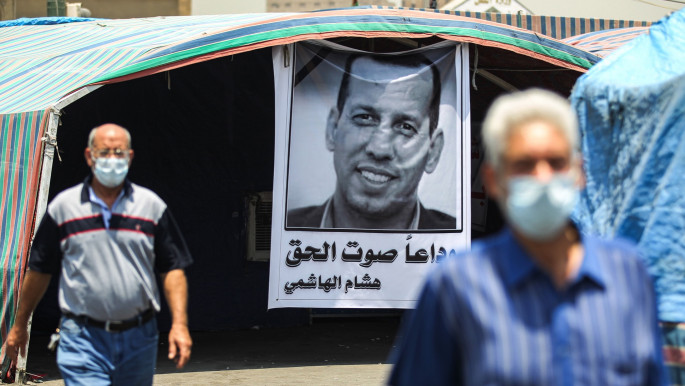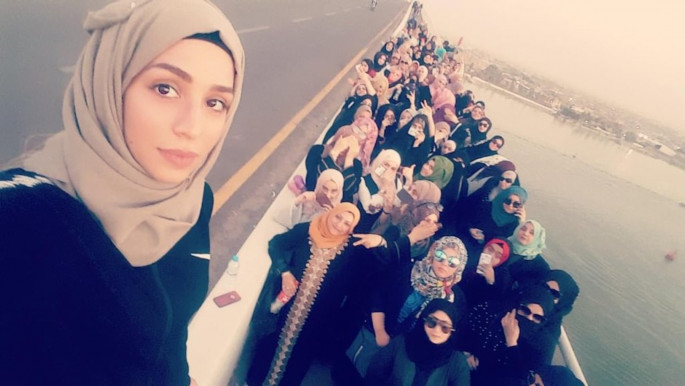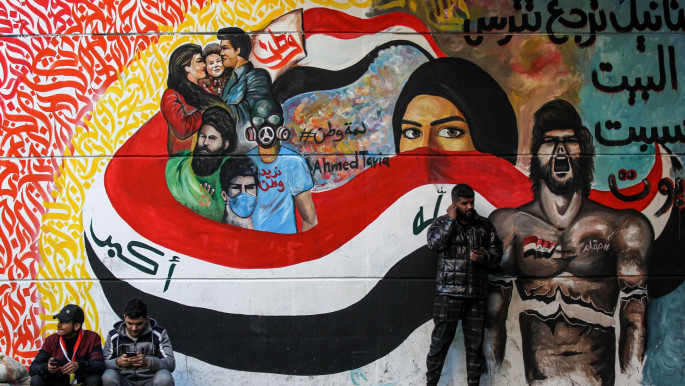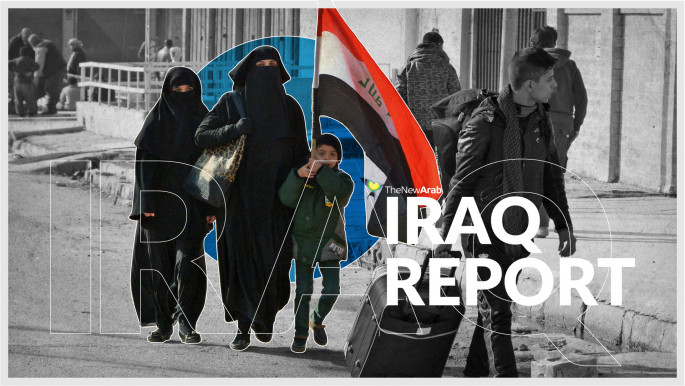The Iraq Report: Anti-corruption activists assassinated with impunity
Iraqi activists who are seen as high-profile organisers and leaders of the anti-corruption protest movement are once again being targeted for assassination.
A series of prominent figures, from academics to social media influencers and political activists, have been gunned down recently by shooters alleged to be linked to Iran-backed militias, fuelling anti-Iran sentiment in a country already beset by political and sectarian violence.
These activities have led Prime Minister Mustafa al-Kadhimi to vow justice for those killed by gunmen who either operate as "rogue elements" of the state security apparatuses or under the auspices of religious extremist militant groups that are closely connected to foreign powers.
In a sign of eroding Iranian clout, and for the first time since 2003, a sitting Iraqi prime minister has also tacitly criticised Iran for dealing with Iraq through its proxies rather than through official channels.
Anti-corruption activists assassinated
Two anti-corruption protest organisers have been assassinated with a further four wounded in the southern Iraqi city of Basra since mid-August in a campaign of violence targeting a youth political group, Human Rights Watch has said.
 |
Iraqi activists who are seen as high-profile organisers and leaders of the anti-corruption protest movement have been gunned down |  |
On 14 August, activist Tahseen Osama was shot dead by two masked gunmen days after criticising Basra police chief Lieutenant General Rashid Flayih for having failed to protect protesters and for allowing pro-Iran militias to rule the city's streets and kill with impunity.
Flayih was earlier filmed criticising the Basra protesters as Israeli and Saudi Arabian agents and provocateurs, leading Iraqi activists to highlight his connections with Iran and drug smugglers who operate across the porous Iraqi-Iranian border.
 |
|
| The Iraq Report: Hisham al-Hashimi's killing sends a grim message to opponents of Shia militias |
Less than a week after Osama criticised the police chief, gunmen stormed his apartment and opened fire without warning, killing the protest leader and wounding his brother before fleeing the scene.
The murder shocked Basrans who took to the streets to protest militia violence and lawlessness once again, but they were unprepared for what followed.
On 19 August, and again just days after Osama's killing, another armed gunman with suspected ties to Iran-backed militias opened fire on outspoken Iraqi activist and fitness instructor Dr Riham Yaqoub, killing her in a hail of bullets fired from an assault rifle as she left the gym in her car.
Yaqoub has been a high-profile leader and organiser of protests and women's rights initiatives in Basra since at least 2015, but increased her activism following the mass demonstrations over the Basra water pollution crisis of 2018 where almost 120,000 people were hospitalised with water poisoning.
Those demonstrations were also put down with brutal force from both state security and Iran-linked militias.
In between the two slayings, four other activists survived assassination attempts which some commentators have described as a being part of a 'new strategic model of repression' that seeks to silence powerful or emerging voices within the Iraqi political spectrum that is opposed to the established political order. All the slain and wounded activists were part of the same grassroots organisation known as the Basra Civil Youth Group.
 |
The situation in Iraq has devolved to the point that gunmen can roam the streets and shoot members of civil society with impunity |  |
Members of the organisation had told HRW that they intended to contest elections by forming a new political party that ran on an anti-corruption, anti-sectarian platform. However, it is unclear if the recent assassinations and attacks have forced them to reconsider due to the dangers they face.
The group have been maligned on social media as agents of Israel, the United States, and Saudi Arabia. Prior to her killing, Dr Yaqoub was repeatedly threatened and photographs of her visiting the US Consul in Basra were circulated as evidence that she was a 'Western puppet'.
While prime minister Kadhimi denounced the assassinations, he has been criticised by civil society activists as well as human rights organisations for not following up on his pledges to bring the killers of protesters to justice.
"The situation in Iraq has devolved to the point that gunmen can roam the streets and shoot members of civil society with impunity," said Belkis Wille, senior crisis and conflict researcher at Human Rights Watch. "It's unclear whether the federal government is even able to rein in the violence at this point and ensure justice for victims."
The lack of concrete measures taken to protect civilian protesters has led to increased violence, with demonstrators torching the regional parliamentary office in Basra and attacking headquarters belonging to political parties associated with Iran.
 |
|
| Rest in Power: Reham Yacoub's assassination casts its long shadow over Iraq |
Kadhimi announced last Saturday that he had ordered security forces to hunt down and arrest those responsible for planning and executing attacks on demonstrators. However, HRW has criticised the Iraqi government for failing to prosecute any high-level decision makers despite numerous promises since Kadhimi came to power in May.
PM tacitly criticises Iran for its proxies
In a wide-ranging interview with the Emirati-backed The National earlier this week, Kadhimi tacitly criticised Iran's preference for engaging with its proxies to influence policy in Iraq rather than going through official channels, a first for any sitting Iraqi premier since the US-led invasion in 2003.
Asked about Tehran's interference in Iraq, Kadhimi said: "We believe two principles should guide our relations. First, non-interference in the domestic affairs of each country and rejecting the use of the territories of either country to launch an attack on the other, and the second principle being that relations with Iran should be state-to-state based on mutual interests."
This has been understood to underline the reality that, rather than going through official channels and dealing directly with the Iraqi government, Iran prefers to leverage its numerous political, military, and economic proxies to apply significant pressure on Iraqi leaders to adopt policies that favour Tehran.
 |
Kadhimi tacitly criticised Iran's preference for engaging with its proxies to influence policy in Iraq rather than going through official channels |  |
While still tempered, this does represent the first time a sitting prime minister has indicated Iranian meddling as a cause of concern.
Despite also being seen as friendly to both the United States and Iran, former premier Haidar al-Abadi only went so far as to ask both those countries not to fight out their differences on Iraqi territory without any mention of the malign influence exercised by either party.
Abadi was also implicated in a leak of Iranian intelligence cables of forging ties with Tehran's top spy agencies and offering to provide them with material support. However, and after his departure from office following his electoral defeat, Abadi blamed Iran for blocking his bid for a second term in office.
 |
|
| The Iraq Report: Mustafa al-Kadhimi takes the helm in stormy political waters |
Other prime ministers have been openly supportive of Iran, including former Prime Minister and Vice President Nouri al-Maliki, widely recognised as one of the most sectarian and divisive politicians to ever hold the reins of power in Iraq.
It was under Maliki that sectarian tensions exploded, ultimately leading to the Islamic State (IS) group's conquest of about a third of Iraq in 2014.
Kadhimi's veiled criticisms of Iranian interference and meddling likely results from his long-standing career as both a journalist and Iraq's spymaster since 2016. As a journalist, Kadhimi penned articles criticising Iranian interference and questioning whether Iraqi elections would be decided in Baghdad or Tehran.
As chief of the National Intelligence Service, Kadhimi oversaw Iraqi intelligence efforts against IS and would have seen first-hand how pro-Iran sectarian Shia militias exacerbated the conflict, with many of these militias implicated in war crimes against the Sunni Arab population.
Further, Kadhimi will have to bear in mind the burgeoning anti-Iranian sentiment in Iraq that has eclipsed any anti-American sentiment. This is largely due to the fact that Iran has consistently outplayed the United States in Iraq and is arguably the more influential of the two competing powers.
As such, Iran takes the lion's share of the blame for Iraq's woes, despite the post-2003 political order having been set up by Washington only to be exploited by Tehran.
As the 40th anniversary of the start of the Iran-Iraq War looms next month, Iraqi nationalistic sentiment will be high. Although that war was fought under the rule of former dictator Saddam Hussein, it is still seen as a moment of national struggle against Iraq's long-term antagonist, Iran.
Should the anniversary lead to open protest against Iran and its proxies, it remains to be seen how militias will react. However, if the empirical record is anything to go by, yet more protester blood will be spilled as Iraqis continue in their struggle to assert their sovereignty.






 Follow the Middle East's top stories in English at The New Arab on Google News
Follow the Middle East's top stories in English at The New Arab on Google News


